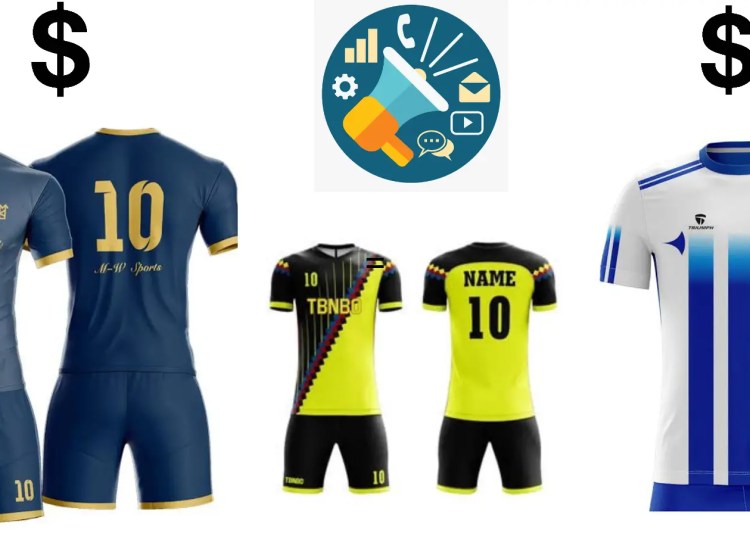How To Start Football Jersey Business Today

Guide You How To Start Football Jersey Business In Nigeria
How To Start Football Jersey Business – Beyond being the most populous country in Africa, Nigeria is also known for housing some of the most dedicated football fans in the world. Majority of Nigerian football fans support foreign football clubs, especially those in Europe, thus becoming a hotspot for sales of club jerseys.
In this article, we will provide a detailed guide on how to start football jersey business in Nigeria.
How To Start Football Jersey Business
In Nigeria: Step-by-Step Guide If you are interested in this business, read on as we discuss everything you need to know. Before we begin, it is assumed that you already have your capital prepared. Now, let’s get started. On How To Start Football Jersey Business.
1. Do Market Research
To begin a jersey business, the first step is to carry out market research to determine if the business is feasible.
While there are multiple aspects to consider when conducting market research for this type of business, there are specific elements that should be investigated during the survey. Defining your target audience is a crucial element of the market survey for this business. Your target audience may consist of potential customers, retailers, or distributors.
During your market research, it is important to conduct a market analysis. This involves identifying the size of the market, its potential for growth, and any trends that could affect the jersey industry. Additionally, it is recommended to gather information on customer preferences and needs, explore different distribution channels for your jerseys, and analyze pricing strategies in the jersey market. When conducting market research, it is important to not only identify and analyze your competitors, but also to develop an action plan based on your findings.
There are various methods you can use to collect data for your market survey, such as interviews, questionnaires, online research, and industry reports.
2. Choose the Right Location for Your Jersey Business
Once you’ve decided to start a jersey business, the next step is to carefully select a strategic physical location. This will help you reach a wider range of potential customers. In addition, having an online store in addition to your physical store can further expand your customer base. By offering both options, you can cater to different customer preferences.
When choosing a physical store for your jersey business, there are certain qualities you should look for. These include easy access for both pedestrians and drivers, sufficient parking space, and enough room to display your jerseys. Having a physical store can greatly enhance your local presence and increase brand recognition.
It is recommended to have both physical and online stores for your jersey business. However, if you don’t have
enough resources to rent and operate a physical shop, you can opt for an online store. Just make sure you have enough storage space for your merchandise. It is important to plan for establishing a physical store once your business starts to grow. This will provide a well-rounded and flexible strategy for your jersey business.
3. Allocate Your Budget Wisely
During this stage, it is important to allocate your available funds wisely in order to start your jersey business
successfully. It is crucial that you have already determined the costs of every thing you need during your market research phase. Therefore, allocate your budget to cover expenses such as rent (if you plan to have a physical store), jersey stock, utility costs, business registration, and other necessary expenses.
Depending on your budget, you may need to prioritize and include only the most essential items, leaving room for additional costs in the future. It is highly recommended that you stick to the budget you have created to avoid any financial deficits.
4. Hire A Staff
If you are planning to start a jersey business on a large scale, it is important to hire experienced staff members who have sales experience in the sporting goods industry. However, if you are starting small and don’t have enough funds to hire additional help, you may not need to employ a staff. In this case, you could consider working with volunteers who are willing to help you as a startup jersey business owner. It is important to offer reasonable incentives and benefits to these volunteers to encourage their participation.
5. Buy Jersey In Bulk
If you already have a physical store or a storage space (if you plan to start a virtual store), the next step is to buy
the jerseys you want to resell in bulk from a supplier. It’s important to note that there are different qualities of jerseys available. Some are high-quality jerseys produced in Europe, while others are replicas made in China and are cheaper. The quality of jerseys you stock up on should be determined by the preferences of your target audience.
Now that we understand the different qualities of jerseys, let’s explore the various options for sourcing your merchandise. There are two options for obtaining merchandise for your jersey business:
-
Importation
The first option is to import the jerseys from overseas. If you are looking for high-quality jerseys, consider getting them from Europe. On the other hand, if you are interested in selling replicas, China is the recommended source. To find companies that ship jersey products to Nigeria, you can use trade magazines and the internet. Once you have identified potential suppliers, follow up with them to proceed with the importation process.
-
Wholesale Distribution
The second option is to source your stock from wholesale distributors in your local area. These distributors already import football kits in large quantities, making them a convenient choice for startups. It is advisable to start with distributors for your initial stock. After gaining experience in the jersey business for about six months to a year, you can then consider purchasing directly from manufacturers. However, it is important to carefully review the policies and offers of different manufacturers to make the best choice.
6. Promote Your Jersey Business
In order to stay ahead of your competition, it is important to invest in promoting your jersey business. This will help you reach a larger audience and retain your existing customers. There are various marketing strategies that you can use to promote your jersey business. You can choose to use a single strategy or a combination of multiple strategies.
Here are some effective marketing strategies to consider on How To Start Football Jersey Business.
-
Online Advertising: Utilize online platforms such as social media, search engine ads, and display ads to reach a wider audience.
-
Content Marketing: Create valuable and informative content related to jerseys, such as blog posts, videos, or infographics, to attract and engage potential customers.
-
Social Media Marketing: Establish a strong presence on popular social media platforms like Facebook, Instagram, and Twitter. Regularly post engaging content, interact with your audience, and run targeted ad campaigns.
-
Influencer Marketing: Collaborate with influencers or sports personalities who have a strong following to promote your jerseys. This can help increase brand visibility and credibility.
-
Email Marketing: Build an email list of customers and potential customers. Send regular newsletters, exclusive offers, and updates to keep them engaged and informed about your jersey business.
-
Partnerships and Sponsorships: Form partnerships with local sports teams, events, or organizations. Sponsor their jerseys or events to gain exposure and build relationships with potential customers.
-
Word-of-Mouth Marketing: Encourage satisfied customers to spread the word about your jersey business. Offer incentives or referral programs to motivate them to recommend your products to others.
Conclusion
By implementing these marketing strategies, you can effectively promote your jersey business and increase your chances of success in the competitive market. That’s How To Start Football Jersey Business.


![87RRI Nigerian Army Recruitment 2024/2025 [Apply Now]](https://www.northxclaim.com/wp-content/uploads/2024/05/nigerian-army-ranks-and-salary-official-390x220.jpeg)
